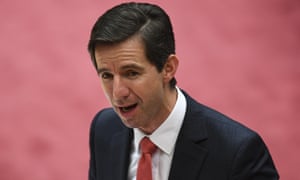Extract from The Guardian
Government criticised for relying on carryover credits from Kyoto to meet Australia’s target
Labor senators have accused the government of relying on “hope” to
meet Australia’s emissions targets under the Paris agreement during
questions about the country’s progress toward its international climate
commitments.
In a tense exchange in a Senate estimates hearing on Monday, senators Anne Urqhuart and Kristina Keneally asked the environment department and Coalition senator Simon Birmingham to explain the most recent emissions projections published by the government.
On current trajectories, the department’s report projects Australia’s emissions will reach 563m tonnes of carbon dioxide equivalent by 2030, which would equal a 7% cut on 2005 emissions levels. Australia’s target is for a 26-28% reduction on 2005 levels. The department told the hearing 2018 emissions levels reached 534m tonnes.
Urquhart asked if this meant the country’s emissions were increasing, but the department argued its numbers were “conservative”.
“It’s not a forecast of what is the potential to happen,” said Jo
Evans, the deputy secretary for climate change and energy innovation. “I
guess what I’m saying is while it’s a projection, it’s very
conservative.”In a tense exchange in a Senate estimates hearing on Monday, senators Anne Urqhuart and Kristina Keneally asked the environment department and Coalition senator Simon Birmingham to explain the most recent emissions projections published by the government.
On current trajectories, the department’s report projects Australia’s emissions will reach 563m tonnes of carbon dioxide equivalent by 2030, which would equal a 7% cut on 2005 emissions levels. Australia’s target is for a 26-28% reduction on 2005 levels. The department told the hearing 2018 emissions levels reached 534m tonnes.
Urquhart asked if this meant the country’s emissions were increasing, but the department argued its numbers were “conservative”.
The prime minister, Scott Morrison, has claimed Australia will meet its targets “in a canter”, but multiple quarterly emissions reports have shown the country’s greenhouse gas emissions tracking upwards.
Urquhart asked if it was correct that, based on the department’s current data, Australia would miss its target by 19%.
“The only way that would be a true statement is if nothing else happened between now and then ... either in unexpected ways or in changes or amendments to the current policy suite.”
But Keneally challenged the government on the extent to which current policies were working and what its confidence was based on that it could meet its commitments.
Birmingham replied the current policies had “steered” the country towards beating its 2020 target.
“So it’s hope?” Keneally said.
“When you assert that we are going to meet our targets, is it based on policies you have already announced or policies you intend to announce in future?” Keneally asked.
Birmingham said the government had made it clear it would be making further announcements on climate change policy leading up to the election.
“We indeed are continually working, as the prime minister has publicly acknowledged, within government on further policy settings that will help to ensure we meet the same trajectory in relation to our 2030 commitments,” he said.
Keneally replied: “So if I could summarise, you’re hoping that past performance is an indicator of future success and that future success will be predicated not on policies you’ve already announced but on some things you’ve yet to announce.”
Later in the hearing, the independent senator Tim Storer grilled the government on its intentions to rely on carryover credits from Kyoto to meet Australia’s target.
Birmingham said “as has been made clear previously and as is consistent with the way in which the Kyoto agreement has worked previously, the government would intend to use carryover if required”.
Storer said the department’s emissions projections data suggested Australia could rely on carryover credits from beating previous Kyoto targets to meet more than half of its international commitments.
He asked if other countries intended to rely on carryover, which Birmingham said he would have to answer on notice.
Richie Merzian, the director of The Australia Institute’s climate and energy program, said it was little wonder school students were protesting about a lack of climate leadership at a national level.
“It is disheartening to hear the government defend Australia’s woeful climate policies and rising emissions in Senate estimates,” he said.
“The government confirmed it is openly using loopholes from a past agreement to meet over half its 2030 reduction target and doesn’t share the view of neighbours like New Zealand that such dodgy practices are not in the spirit of the Paris Agreement.”

No comments:
Post a Comment